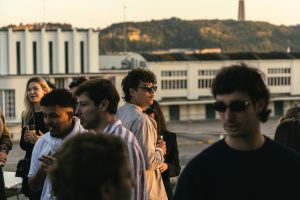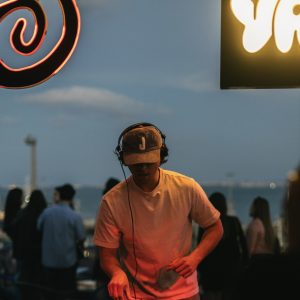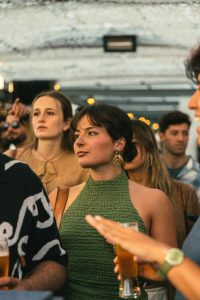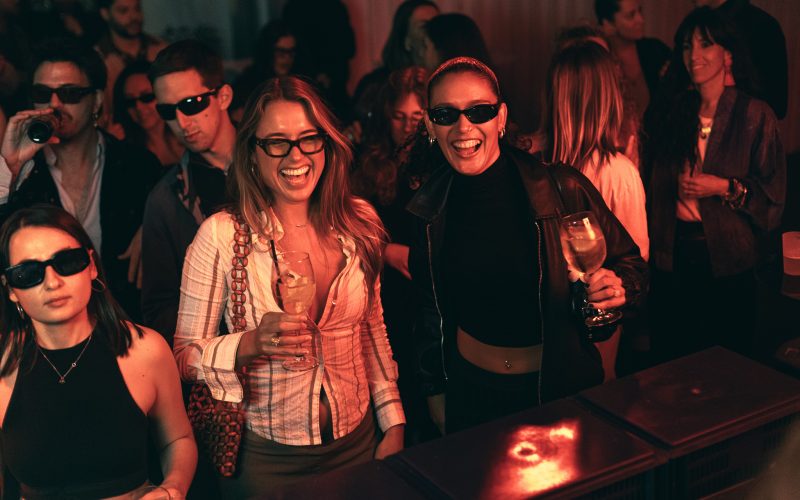Yalla do árabe significa “bora” mas não só, conta Tancredi di Grande o mastermind por detrás do evento must de todos os domingos no rooftop Tutto Passa em Lisboa.
Entre o sol gentil, a brisa de domingo e o Tagus, conversámos sobre o nascimento da Yalla Cult, uma iniciativa que tem vindo a crescer sob a parentalidade de Portugal.
Tancredi di Grande o nosso protagonista du jour, vem da Sicília e é melómano. Enveredou pela música na sua terra-mãe, esquivando-se de projectos mal sucedidos e abraçando os triunfantes. Esta bagagem permitiu-lhe trazer a Yalla Cult à superfície.

Conta-me sobre os teus projectos iniciais em Itália.
Como te dizia, tive sucessos e fracassos; a cena musical na Sicilia é diferente, as pessoas são menos cultivadas, e a maior parte dos jovens acaba por se mudar para estudar ou trabalhar.” Tal como o entrevistado, que frequenta a calçada portuguesa devido ao seu mestrado em Business Analysis. No entanto, continua a gerir o Umami, um projecto que decorre em Itália há cerca de dois anos. “Por isso, [a Sicília] não seria o sítio ideal para iniciar esta aventura. Não só pela vertente empresarial mas também pela vertente artística, dado que seria praticamente impossível sustentar o custo que a falta de audiência traria para a cena. Quando vim para cá, fiquei surpreendido pela positiva, sendo que apesar de Portugal não oferecer muitas oportunidades a vários níveis, a comunidade musical é muito grande.
Com isto, decidi criar este novo projecto Yalla, que começou num pequeno rooftop em Carcavelos e que celebrou o seu aniversário no passado dia 14 de Março – o fruto de uma paixão musical. Foi crescendo e crescendo de 300 para 700 pessoas mais ou menos. O público adorou. Concentrámo-nos muito em fazer actividades na cidade. Estivemos presentes na cidade, fazíamos eventos, muitas vezes gratuitos para chegar às pessoas. No fundo para verem que não procurávamos somente o lado lucrativo deste tipo de empreendimento – que se tem revelado um plug, posso dizer, da indústria dos clubes. Fizemos de tudo para criar um sentido de comunidade.

Fala-me do nome, sei que yalla é uma palavra árabe. Porque é que a escolheste?
Sim, é uma palavra árabe. Quando inicio um projecto deste género tento sempre que seja auto-explicativo no mínimo. Yalla significa ‘ir’, ou ‘bora’. E normalmente as pessoas usam-na de uma forma que até é muito tocante para mim como: yalla yalla, ‘let’s go’. Pode ser usada em muitos contextos mas a minha ideia é que possa ser adaptada à vida quotidiana, quando nos deparamos com desafios dizemos: yalla, let’s go. Keep it simple, take it easy. Esta é a nossa máxima por detrás de todo este projecto, através da nossa música, imagem e marca – o objectivo não é aparentar nada, como acontece muito na cena de hoje em dia. Não estamos a tentar ser cool, só procuramos ser quem somos verdadeiramente. O nosso motto tem sido reformular a club culture com um sorriso. Um sorriso que é por acaso a nossa identidade como marca, e que se reflecte também no logo. Tentamos criar um ambiente sem julgamento, onde todos se podem sentir livres para fazer o que quiserem, mas não ao ponto extremo onde acontece em muitos sítios também. Este é um espaço para todos os que provavelmente não pertencem a nenhuma cena em concreto, mas pertencem à Yalla — onde podem ser livres e ser eles próprios. Acho que tem sido um dos aspectos que mais nos distingue, esta nossa atitude tem oferecido ao público uma sensação de liberdade. É sempre reconfortante ver vídeos e fotografias que revisitam o que sentimos enquanto tocávamos eu e o meu parceiro Kuba, e o envolvimento louco da audiência. E isto é o mais importante para nós. Sem telemóveis, nada extremo, apenas humanos a divertirem-se. E na minha opinião é o que está em falta, há uma cultura díspar da nossa neste ambiente, muita gente frequenta festas só para marcar presença, e não pelo propósito de se divertirem – que deveria ser a prioridade.

Desenvolveste esta ideia a solo, ou com o teu parceiro?
De certa forma foi por mim mesmo, mas não construí nada sozinho claro. Nada se consegue sozinho. Éramos cinco inicialmente, mas devido a uma série de situações a maior parte abandonou o projecto que acontece muito nesta área. Tivemos de reestruturar a equipa. Felizmente ainda tenho um dos parceiros originais, o Kuba, que é um dos DJ’s residentes da Yalla. Ele tem acompanhado o projecto desde a fase inicial, tem sido o meu braço direito, aliás o meu ombro. Mas também há muita gente que nos tem dado apoio. O Francesco por exemplo.
Podemos dizer que a cultura italiana teve uma grande influência , não só pelo facto das nossas festas serem frequentadas por italianos, mas também porque o nosso evento é mais adequado para pessoas do Mediterrâneo: a maior parte da audiência vem da Itália, Espanha e Portugal claro. Ainda não temos grande conexão com a comunidade alemã infelizmente, talvez porque temos valores diferentes.

Como escolhes os DJ’s?
Depende.
Desejas manter uma vibe específica entre DJ’s? Como aportas isso?
Naturalmente, procuramos manter uma linha coerente de estilo musical entre DJs. Partimos da ideia de que somos um coletivo de música house, claro, mas house é um género musical muito abrangente. Por isso muitas vezes não é fácil definir se um DJ se encaixa na Yalla, mas na maioria das vezes apenas passamos pela experiência em si. Escolhemos pessoas que já tenhamos ouvido, e que nos tenham transmitido uma sensação forte. Para comemorar o primeiro ano da nossa iniciativa, a Teresa, uma DJ alemã veio tocar a nosso pedido. Tinha ido a um gig dela e saímos com um sabor fenomenal a diversão e prazer. E como te tinha dito, é isto que queremos dar ao nosso público, e se não o sentirmos na pele, certamente não vamos convidar um DJ que não traz este tipo de sensações à audiência.
Por outro lado, investimos bastante na comunidade. Gostamos de dizer que o sucesso de muitos DJ’s partiu do nosso apoio. Não somente eu, mas o Kuba também. Há muitas pessoas que vieram para Lisboa com uma ideia de partilhar a sua música, e através de algumas conexões tivemos a possibilidade e as integrar na nossa equipa. E com sessões de estúdio, pudemos dar-lhes do melhor para expandirem o seu conhecimento. Não só permitindo a possibilidade da experimentação mas também a possibilidade de praticar durante os eventos. Dando sempre o know-how desde a escolha do tema, à mistura da música correcta e até mesmo como ler a audiência da forma mais inteligível.
Portanto de certa forma és um man in the making of DJ’s? Não diria um produtor oficialmente, mas uma espécie de…
Sim é o objetivo, de certa forma.
O que quero dizer é que as vossas ações já o demonstram.
Sim, mas isto está estritamente ligado à nossa identidade. Não retribuir às pessoas que vêm aos nossos eventos e que fazem parte da comunidade seria errado. É importante criar um círculo de pessoas que representem isso. É claro que temos de partilhar os mesmos valores, não só em termos musicais, mas também como pessoas.
Eu não trabalho, não toco, e não fico com pessoas com quem não seria capaz de sair noutro tipo de cenário, noutro ambiente. E normalmente todas as pessoas que fazem parte deste projeto tornaram-se bons amigos meus e dos outros. Gostamos de dizer que somos uma família. Toda a gente o diz, mas nós fazemo-lo de facto. Andamos juntos, plantamos coisas juntos, e é bonito vermo-nos uns aos outros nos momentos em que ganhamos e em que fracassamos. Porque, claro, é algo que também é muito importante. Se não formos capazes de criar um ambiente em que trabalhamos com pessoas capazes de compreender que há momentos em que falhamos, não somos capazes de avançar no tempo e fazer eventos de êxito. Afinal de contas, isto continua a ser uma aventura.
A propósito, há uns dias vi uma fotografia nossa – para anunciar os nossos eventos costumávamos imprimir centenas de cartazes e depois andávamos pela cidade a colocá-los em todo o lado. Era totalmente ilegal, não era governado da melhor maneira. Viam-se 30 pessoas a vaguear pela cidade com cola, aqueles cartazes enormes, os pincéis, éramos terríveis. Éramos perseguidos pela polícia, de certeza chamados pelos donos das lojas onde afixávamos os cartazes. Terrível, terrível. Deixámos de o fazer porque percebemos que, agora que estamos a ter um pouco de visibilidade, provavelmente não seria a melhor ideia ser associados a este tipo de conduta. Mas esse foi, na verdade, um dos momentos mais bonitos desta aventura, conseguimos estabelecer uma amizade duradoura com pessoas que irão sempre recordar esses momentos, e tal como nós guardá-los no coração.
É verdade, essas memórias são para sempre. Como encontraste este sítio? Sentes que reflecte e representa a vossa marca, identidade, a Yalla em geral?
A Yalla e o Tutto Passa encontraram-se em Outubro através de uma das gerentes deste espaço – uma mulher fantástica, das mulheres mais fortes que já encontrei nesta indústria. É muito difícil encontrar mulheres a trabalhar neste sector, normalmente é um ambiente dominado por homens, e posso dizer que ela me assustou imenso com a sua pujança. Mas sim queríamos apresentar um conceito diferente.
Basicamente, em Itália, uma das coisas que costumamos fazer, sobretudo aos domingos, é dar a oportunidade às pessoas de terem um local onde possam ter uma espécie de reunião social. Na verdade, este conceito tem uma marca diferente, chama-se Gloria, porque quisemos associá-lo à ideia de glorificar um dia específico da semana, que é o domingo. É o dia, digamos, do descanso. Gostamos de dizer que Deus descansou ao domingo, mas nós dançamos.
Adoro.
Bem na verdade muita gente não aprecia esta filosofia. Temos tido muitos católicos neste ambiente. Mas sim, a ideia [do espaço] é retratar algo diferente. Está próximo da nossa marca, mas ainda temos uma forte ligação com a nossa identidade de clubbing, que por agora deixámos um pouco de lado para desenvolver um conceito diferente, que não tem estado presente em Lisboa, ou pelo menos tem estado presente através de grandes eventos como o Brunch.
Queremos criar algo que seja um pouco diferente, estamos também a experimentar um pouco com a música, explorando mais o disco, dada a sensação que este ambiente transmite neste rooftop fantástico debaixo do sol, com uma leve brisa a soprar na face, rodeados por esta paisagem fantástica.
Há alguma mensagem que gostasses de deixar para quem está a começar? Tens um motto ou uma lição que aprendeste que te tenha ficado contigo?
Trabalhar com as pessoas certas. Ninguém consegue fazer nada sozinho. Ninguém.
Podes ter o maior budget de sempre, mas não chega. É preciso encontrar as pessoas certas para trabalhar/colaborar, porque senão todo o esforço, todo o investimento, será em vão. Não conseguirás tirar proveito nenhum. E para as pessoas que desejam entrar nesta indústria, é muito importante compreenderem que o foco mais importante é a música e disfrutá-la. Sucesso e lucro virão depois de uma longa caminhada.
ENGLISH VERSION
Yalla in Arabic means ‘let’s go’, but not only that, says Tancredi di Grande, the mastermind behind the must-attend event every Sunday on the Tutto Passa rooftop in Lisbon.
Between the gentle sun, the Sunday breeze, and the Tagus River, we talked about the birth of Yalla Cult — an initiative that has been growing under Portugal’s wing.
Tancredi di Grande, our protagonist du jour, hails from Sicily and is a true music aficionado. He carved his path through his homeland’s music scene, steering clear of failed ventures and embracing the ones that soared. This journey brought Yalla Cult to the surface.
Tell me about your previous projects in Italy.
“Like I was saying, I’ve had both successes and failures,” Tancredi tells me. “I’ve been running a project called Umami in Italy for almost two years now.” Born in Sicily, he’s no stranger to the complexities of building something in a tough environment.
“The music scene in Sicily is a bit different. People are generally less cultured, and most young people end up leaving — like I did — to study or work elsewhere,” he explains. Now living in Portugal for a master’s in Business Analysis, he still keeps one foot in his Italian project. “That’s why Sicily wasn’t really the right place to launch this venture. Not just from a business perspective, but also artistically. The lack of audience makes it nearly impossible to support the costs of building a scene.” Portugal, however, was a surprise. “When I moved here, I was actually surprised. Even though Portugal doesn’t offer much on many levels, the music community is huge.” That energy gave rise to a new project: Yalla. “I decided to start this new project, Yalla, which began on a small rooftop in Carcavelos. We celebrated its first anniversary on March 14th. What started as a passion project just kept growing — from 300 to around 700 people.”
But beyond numbers, the focus was always on creating real cultural presence. “We really made an effort to be present in the city — hosting events, many of them free, just to reach people and show that we weren’t just in it for the profit. We did everything we could to build a sense of community.”
Tell me about the name, I know that Yalla is an Arabic word. How did you come around to name your event after it?
“Yes, it’s an Arabic word,” Tancredi begins. “Every time I start a project like this, I try to make sure that at the very least, it’s self-explanatory.” Yalla means go, or let’s go. A common expression in Arabic, it’s often repeated — yalla, yalla — a rhythmic encouragement that resonates deeply with him. “It’s a word that can be used in so many contexts,” he explains, “but my idea was that it could also become part of daily life. When you’re facing something tough, you just say: Yalla, let’s go. Keep it simple, take it easy.” This phrase isn’t just the name — it’s the ethos behind the entire project. From the music to the imagery, to the community itself, the goal was never to pretend or posture, but to remain honest and human.
“We’re not trying to be cool — we’re just trying to be real. Our motto for a long time was: reshaping club culture with a smile. That smile actually became part of our visual identity, part of our logo. It reflects the vibe we want to put out.” From the start, Yalla aimed to create a space free of judgment — a safe, inclusive environment where people can truly be themselves. “But not in the way it happens in some scenes, where things get too extreme,” he clarifies. “This is for the people who feel like they don’t quite belong anywhere else in club culture — but they find their place at Yalla. Here, they can feel free, and they can just enjoy.” This open attitude is what sets the project apart. “We’ve always tried to make sure the crowd feels that freedom. Watching the videos, looking back at the photos, and just feeling the energy when Kuba and I are playing — people really let go. They go wild on the dancefloor, and for us, that’s what it’s all about.” No phones, no gimmicks — just people truly enjoying themselves. “And that,” he adds, “is something that’s missing nowadays. Too many people go to parties just to be seen, not to have fun. But fun should be the point.”
Was this something you developed on your own, or together with your partner?
“In a way, the idea started with me,” Tancredi admits, “but of course, I didn’t build any of this alone. Nothing is ever done alone.”
The project initially launched with five people on board, but, as often happens in this scene, life took its course and most moved on. “People come and go — especially in this kind of space. We had to restructure the team,” he explains. “Luckily, I still have one of the original partners, Kuba — one of Yalla’s resident DJs. He’s been there from the very beginning, he’s not just my right arm, he’s my shoulder.”
Over time, Tancredi has also been stepping deeper into the music side of things, as the internal structure of the project shifted and allowed him to get more involved creatively. “But Kuba has always been the constant.” Beyond their duo, there’s also a larger support system. “People like Francesco, for example, have helped us a lot.” And while the project was born in Portugal, its Mediterranean roots run deep: “There’s a strong Italian influence — not just because of our background, but because our parties naturally attract a Mediterranean audience.” Italians, Spaniards, and Portuguese make up the majority of the crowd. “Unfortunately, we haven’t yet connected much with the German community, maybe because we have different values when it comes to what we look for in a party. But that’s okay — we’re building something that speaks to our vibe.”
How do you choose the DJ’s? And is there a specific vibe you try to maintain across the lineup?
“It depends,” Tancredi pauses, before explaining how, while Yalla is grounded in house music, the genre’s vastness makes curation more nuanced than it seems. “We’re a house music collective, of course — but house is huge. It’s not always easy to define whether a DJ fits into Yalla or not. Most of the time, we just go with the feeling.” That means selecting people they’ve heard live, DJs who’ve sparked something — a sensation, an emotion — powerful enough to be shared.
“For our first anniversary, for example, we invited Teresa, a German DJ we’d seen perform here in Lisbon. She left us with this incredible aftertaste of joy and fun.” And that, he says, is the essence of what they hope to bring to the Yalla crowd: real, felt pleasure. “If we don’t feel it first, we’re not going to bring in someone who can’t stir those feelings in others.”
But Yalla isn’t just about curation — it’s also about cultivation. “We’ve always invested in the community,” he says. “There are DJs who became who they are partly because of our support — not just mine, but Kuba’s too.” Many came to Lisbon carrying little more than a passion for music and a desire to share it. Through the connections they’ve fostered, Yalla has welcomed them into its fold. “We do studio sessions, we create spaces for experimentation, and we give people the chance to play at our events. But more than that, we give them the know-how: how to build a set, how to mix properly, how to read a crowd intelligently.” It’s this combination of instinct and mentorship that has helped shape Yalla’s identity — a project as much about community-building as it is about sound.

So in a way, you’re a man in the making of DJs? Not exactly a producer yet, but something along those lines?
“Yes, that’s the goal — in a way.” Tancredi explains that although they’re not officially a label or production house (yet), what they do naturally flows in that direction. And more than anything, it’s deeply tied to Yalla’s sense of purpose and identity. “Not giving back to the people who come to our events and are part of the community would be wrong.” For him, it’s essential to nurture a circle of people who not only align musically, but personally: “Of course we have to share our mutual values. Not only in music terms, but also as people.”
He doesn’t play, work, or stick around with people he wouldn’t also feel comfortable with in any other setting. That intimacy has shaped Yalla into more than a collective — it’s become a chosen family. “Everyone says that, I know. But we actually live it. We hang out, we plant things together, and it’s beautiful to witness each other in moments of joy and moments of loss.” Because that’s the truth of it: even if Yalla is a creative mission, it’s still an adventure, vulnerable to risk. “If you are not able to create an environment where people can understand failure, adventure and revenue gain or loss, you won’t be able to move forward and create truly successful events.”
Amidst a smile, a memory from the early days arises: “Just the other day I saw a photo of us — back when we used to promote our parties by printing hundreds of posters and running around town to glue them up everywhere. It was totally illegal. We’d be thirty people roaming the streets with brushes, dry glue, and these huge posters… we were a mess.” He laughs at the chaos: “The police would chase us, shop owners would call us out — it was terrible.” But behind the mischief there was something real, “We stopped, of course — now that we’re getting a bit of visibility, we can’t really afford to be associated with that kind of behavior. But honestly, those were some of the most beautiful moments. We built friendships that will last, and we all keep those memories in our hearts.”
It’s true, those memories stay with us forever. So how did you find this place? Do you feel it reflects and represents your brand, your identity — Yalla in general?
“Yalla and Tutto Passa found each other back in October, through one of the managers of this venue — an incredible woman, honestly one of the strongest I’ve ever met in this industry. It’s rare to see women in this line of work — it’s usually such a male-dominated space — and I have to say, she really intimidated me with how fierce she is.
But yes, we wanted to bring something different. In Italy, one of the things we tend to do — especially on Sundays — is give people a space for social gathering. Actually this concept has a different branding: it’s called Gloria – because we wanted to connect it with the idea of glorifying a specific day of the week, which is Sunday. It’s the day of, let’s say, of rest. We like to say that God rested on Sunday, but we dance.
I love that.
“Of course, not everyone shares that philosophy. There are a lot of Catholics around in this scene. But yeah, the idea here was to create something different. It’s definitely close to our brand, but we’ve also taken a bit of a step back from the clubbing side for now, to develop something new — something that hasn’t really existed in Lisbon yet, or at least only through big events like Brunch. We want to create something a little different. We’re experimenting more with the music, leaning more into disco, because it just makes sense in this kind of setting — this amazing rooftop, under the sun, with the breeze on your face and the whole city stretching out around you.”

Is there a message you’d like to leave for anyone just starting out? Do you have a motto or a lesson that stuck with you along the way?
Work with the right people. No one can do anything alone. No one.
You can have the biggest budget in the world, and it still won’t be enough. If you don’t have the right people around you — to work with, to build with — then all that effort, all that money, it’ll mean nothing. It’ll go to waste. And for anyone wanting to step into this industry, it’s important to understand: the focus, especially at the beginning, has to be the music — and the joy of it. That’s the heart of it all. Money will come, and success comes after a long run.
Alright, that’s it! Thank you.
Thank you so much.


